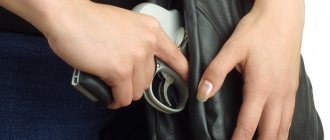In what ways is the search carried out?
In the event that a thief or robber takes an expensive communication device from a victim, the police work in the following main ways:
- Operational activities. This is the most ancient method. Using contacts and informants in the criminal environment (among pickpockets, robbers, buyers of stolen goods), operatives receive information - and work based on it.
In many cases, information of this kind cannot be used in court in the future - however, these checks are used when planning investigative actions, which, in turn, are recorded and can be used as evidence.In addition to informants, the method of personal contact also works well: knowing the phone number (the old one or the new one, if the criminal has changed the SIM card), the operative calls back and, under some pretext, arranges a meeting - and detains the new owner of the phone. Despite its primitiveness, this approach often turns out to be effective.
- Information obtained during investigations into other incidents. It often happens that during an investigation, information comes to light relating to other cases in progress. In this case, such information is used to plan other investigative actions and operational search activities (OPM).
- Technical search methods.
The last one is worth special mention. Mobile equipment can be found in the following ways:
- By number used. Each phone has two-way communication with a network of cellular repeaters.
Based on the response, you can roughly determine within which “cell” it is located. Moreover, if a thief is so stupid that he uses a stolen SIM card, law enforcement agencies can listen to his conversations - and, using the data obtained, find the phone and its new user. Despite the primitiveness of this approach, this method works even for very serious criminals. - Using IMEI. Each mobile device has its own unique number assigned by the manufacturer.
Knowing it, the police can receive a response from a specific device - and then find it on the ground using both information from cellular operators and mobile direction-finding stations. The work of direction finders is very expensive, and is usually used only when investigating particularly serious crimes against the state. However, the effectiveness of this method is very high. - Using special programs. Many modern phones are equipped with navigators that allow you to use GPS to determine the location of the device with an accuracy of several meters. In this case, you can find your phone very quickly. However, this requires that the corresponding application be previously installed on the device.
Important. Any technical search methods only work when the device is turned on. If the criminal immediately turned off the phone (and to be on the safe side, he also removed the battery from it), it is fundamentally impossible to locate the device.
Is there any benefit to surveillance?
By tracking the location of a cellular subscriber, state security agencies can quickly find a wanted criminal.
Also, using a mobile phone signal, doctors or rescuers can find the victim. This is why it is important for cellular operators to use technologies that provide sufficiently high accuracy in determining the subscriber’s location.
The ability to track also allows relatives to receive information about the whereabouts of a child or elderly relative at any time. Many operators have this service in their tariff plan.
Is it possible to help the organs?
According to statistics, out of every 100 stolen phones, only 13 come back to light. The majority of them are found during operational investigations and investigative actions. However, this is not a reason to fold your hands: for those phones whose theft was not reported, the statistics are completely different - they are not found in 100% of cases.
If the victim wants the stolen property to be returned to him, he should take a number of actions:
- Provide the police with all the documents he has for the phone: instructions, receipts from the store, receipts from payment terminals for cellular communications, etc. This will allow him to distinguish a specific copy of the phone from many thousands of its “one-series” copies, and at the same time confirm the fact that the device actually belongs to the victim.
- Check whether the phone was actually stolen and not lost by the owner himself. Oddly enough, in many cases the owner himself forgot or dropped the device from his pocket, and the thieves had absolutely nothing to do with it.
- Submit a request to the operator company to provide call transcripts. By law, each SIM card is linked to the owner’s passport data. Therefore, if a thief used an old card and called or sent an SMS to someone from a stolen device, the police have a chance to roughly find out from their social circle who exactly committed the theft.
- Place advertisements in city newspapers, forums or online public pages. Lost phones are often returned to their owners in this way. Many sellers or buyers of equipment on the secondary market check phone data from advertisements - and in case of theft or discovery, contact the owner or the police directly.
- Go to pawn shops and buy up phones. Often the criminal does not waste time searching for a distribution channel, but simply sells the device through legal resellers. If you find your phone for sale, you must immediately notify the police.
We tell you more about what procedure to follow in the event of a phone theft and how to properly file a police report in this material.
However, there are things that, on the contrary, should never be done . These include:
- Using “special programs” to locate a mobile phone on the ground. No programs work like that.
Only the police or the FSB have equipment that allows for full-fledged direction finding - and ordinary users, at best, will receive technical data about the repeater within the range of which the phone was last broadcast (and although repeaters operate on short waves, their radius is measured hundreds of meters even in large cities).More often than not, these types of paid services on the Internet turn out to be pure fraud.
- If you include too detailed information about your phone in your ad, there is a high risk of running into scammers. For the same reason, when coming into contact with people who allegedly found the device, you should not make any kind of advance payment.
How to fill out an application correctly
The victim still needs to write a statement. The main thing is to arrange everything correctly. Usually the police help citizens with this by providing a sample. However, when applying, it is important to consider the following:
- The application is drawn up in the name of the head of the department. Therefore, in the “header” of the document you should indicate his full name, title, etc. You also need to write your personal data.
- Next comes the part of the document in which the victim needs to detail the circumstances of the theft of the phone. If he does not know when exactly the theft occurred, he should describe all the events of that day.
- You also need to indicate which phone was stolen. That is, the brand, model, some individual characteristics of the thing. The mobile number is also written.
- Then a request is made to find the perpetrators and return the stolen goods. If there are suspects, their personal information should be provided.
- Next, the applicant must indicate that he knows about criminal liability for libel.
- Date and signature.
Help: if the owner knows the IMEI of the phone, then it is necessary to write it in the application. This will make your search easier.
When submitting a document, you should make sure that the police officer has registered it, that is, entered it in a special journal. The applicant must be issued a ticket with a registration number through which he can monitor the progress of the investigation. If this procedure is not followed, the application may simply disappear. It will be impossible to prove the fact of the appeal after this.
The period established by law for the search for a telephone device of the Code of Criminal Procedure
The Russian Federation establishes the following deadlines that the victim can rely on:
- 3 days – according to Part 1 of Art. 144 of the Code of Criminal Procedure of the Russian Federation, it is during this time that the police must either initiate a criminal case or refuse to initiate it with reason. At the request of the investigator, the period can be extended to 10 days, and if necessary, to conduct an examination or operational investigation - up to 30 days.
- The period of investigation itself, provided for in Art. 162 of the Code of Criminal Procedure of the Russian Federation, cannot be longer than 2 months. The chief may, at the request of the investigator, extend the investigation period for another 3 months.
- However, Art. 208 of the Code of Criminal Procedure of the Russian Federation allows for the suspension of the investigation. For example, this is acceptable if a search for a suspect is required. As a rule, suspension is permissible only after the deadlines under Art. 162 of the Code of Criminal Procedure of the Russian Federation. If new information is obtained during the search, the investigation is resumed.
- Finally, the statute of limitations must also be taken into account. If 2 years have expired (for ordinary theft) or 6 years (for pocket theft), then, according to Art. 24 Code of Criminal Procedure of the Russian Federation and Art. 78 of the Criminal Code of the Russian Federation, the case can be dismissed even if the thief is found.
Thus, the realistic assumption is that the police will only seriously search for a stolen phone for 2 to 5 months.
From our separate publications you will learn what to do if your phone is stolen, as well as the possible nuances of such a crime and the provided liability for it.
If you pick up someone else's device, is it considered theft?
There is nothing illegal about picking up an unowned item.
, No.
Another thing is that this is also not recommended for safety reasons, because even a small object filled with explosives can cause a tragedy
.
But no one will ever call the finder a criminal if the item appears to be ownerless.
With regard to communications and computers, everything is different. Especially if the finder knows whose gadget it is, that the owner of the phone is somewhere nearby or can return to look for the loss
.
The presence in the device’s memory of addresses, contacts, and other data through which he could have contacted the owner’s friends or even himself, but deliberately did not do so, will also work against the finder in the event of a trial.
Then it is possible that the person who concealed the find will have to answer
in accordance with the sanctions provided for in Art. 158 of the Criminal Code, that is, for theft.
Thus, in order to avoid unpleasant conversations with the owner of the phone and, probably, with the law enforcement officers, it is better, after all, if you find a gadget, try to determine the owner
or at least call the numbers in his phone book.
Real average terms
In practice, the situation with the time period during which the police find stolen devices is as follows: the sooner the victim makes a statement, the faster the phone can be found.
As a rule, if such crimes are solved, it is only in hot pursuit. With great luck, the police can find a mobile phone on the same day (for example, if the criminal is detained for some other reason and the stolen item is on his person).
On average , if a phone can be found at all, this happens in the first 2-3 months after the theft. This period should be considered realistic.
Theft and discovery - what's the difference?
It is not difficult to distinguish a find from a theft at first glance. Mandatory component of a criminal act
(Article 158 of the Criminal Code) - the fact of intentionally causing damage to another person, secret appropriation of his property.
The loss occurs as a result of a combination of circumstances, forgetfulness or carelessness of the owner. No responsibility
the finder is not in danger, except, perhaps, from remorse of his own conscience.
The difficulty is that almost all phones found have contacts in their memory, and you can always get to the police station, and deliberate refusal to use these opportunities to find the real owner is a reason for being accused of theft
.
How do scammers work on Avito? find out right now.
When can you stop hoping that they will find you?
If a police report has been filed, but the investigation period (including a possible extension of 3 months) has expired, you should forget about the phone. A suspended case may hang on for years, but in reality the police will mainly work on “fresh” crimes.
Due to the overload of cases, the main forces are always directed either to solving new crimes or to serious and high-profile cases. Therefore, if 5-6 months have passed, it is better not to hope; if the phone is found, it will only be by chance.
Longer sentences can be expected only if a more serious crime than theft has been committed. If, for example, the phone was taken by an armed robber, a rapist, or even the murderer took it from the victim’s corpse, the device becomes additional evidence, and they may continue to search for it. However, even in this case, if nothing was found in a year, you should not count on a successful search result.
Camera performance
Cameras on your smartphone should not be scratched or foggy. This will greatly interfere with filming. Be sure to open the camera application and check all shooting modes to check the functionality of each module. Keep in mind that if the device is budget, then even fully functional cameras will not help you take high-quality pictures.
If you are detained
Any decision of the investigator or inquiry officer may be canceled
.
Complain to the leadership of the investigative agency about the actions of your subordinate. He has the right to cancel the decision.
Contact the prosecutor's office or judicial authority
(Article 125 of the Code of Criminal Procedure).
In the process of challenging, contact the authorities as their competence increases: first to the local authority, then to a higher authority.
For example, before contacting the regional Department of the Ministry of Internal Affairs, resolve the issue at the level of management of the Investigative Department of the Department of Internal Affairs of the Russian Federation
. A complaint that has serious grounds will be satisfied. The charge will be dropped.
Accused of theft
If you are charged with theft for concealing a gadget, that is an act under Art. 158 of the Criminal Code, remain calm and try to convince the investigator that you did not steal the thing, but found it.
The owner is not nearby, you were afraid to give it to strangers and now you were looking for a way to convey what you found
directly to the owner.
No one can guarantee the honesty of even close friends or relatives, so you did not risk handing over the device.
Has the owner been found? Great, let him get his cell phone back and not lose it again.
The absence of signs of theft of property transfers the case to the framework of civil law relations, which means that a criminal case cannot be initiated.
Of course, no one is obliged to prove their innocence
. But in this case, the police will have a legal reason for arrest.






